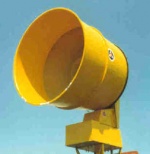Air Raid Sirens Wiki: Difference between revisions
Jump to navigation
Jump to search
(Test edit) |
|||
| Line 1: | Line 1: | ||
{{Main Page}} | {{Main Page}} | ||
{{DISPLAYTITLE:<span style="display: none">{{FULLPAGENAME}}</span>}} | {{DISPLAYTITLE:<span style="display: none">{{FULLPAGENAME}}</span>}} | ||
Revision as of 03:38, 27 October 2014
Welcome to The Air Raid Sirens Wiki!
This site is about air raid sirens. Most people know what these are, and they've most likely heard the sounds, but how many can tell you what they look like?
What they weigh? How they work? Who makes them? Not many! That's why this site exists--to satisfy anyone who wants to know more about these sirens.
New reader or editor? Need help? Click here.
Did you know?
- ...that the Surry Power Station's activation sequence for their system results in a distinct "triple windup"?
- ...that, although having two more cells, the Modulator II 8032B is still 23.64 inches shorter than the Modulator 6048?
- ...that the national siren system in Denmark is one of the largest single systems using Whelen sirens, with 1,078 sirens covering 80% of the country?
- ...that the Model 2 is the oldest siren currently in production, dating back to around 1921?
- ...that Fort McPherson, Northwest Territories, and Cambridge Bay, Nunavut, are home to two of the few sirens located north of the Arctic Circle, both STH-10s?
- ...that, contrary to popular belief, the "2001-DC" is not a model in itself, but rather refers to battery-equipped units in general?
Selected siren
The P-50 (later RM-135 and T-135-AC) is a rotating, electromechanical siren that was produced by Alerting Communicators of America (later American Signal Corporation) from 1980 to 2006, when it was replaced by the T-135 AC/DC. It produces 135 dBc at 100 feet, and is the loudest electric siren in the world, as well as the loudest dual tone siren.
Categories
